CompSAt Week: Wildfire
Everything can be reduced to numbers. It’s the unofficial core philosophy of all programmers (the good ones at least). What they do not realize however, is that it is far closer to reality that they think.
Inevitably, man will realize that it is essentially just a complex set of codes – Java codes. You see, we are not the first “humans” that existed. There were already humans billions of years ago, and I’m not just talking about Neanderthals or pre-evolved almost-humans. They were evolved and were able to develop the object-oriented programming language called Java. The language developed exponentially and eventually reached apotheosis. It then became the basis of reality as we know today in a way that is neither rational nor plausible to our lesser minds, but that is beside the point. The point is we are code. And as code, java code, we have methods that can be analyzed.
Your basic Man interface, for example, has the walk method, the eat method, the toilet method and many other basic calls. Now, as I’m sure you can imagine, the man class has several implementations. We have the Teacher class, the Hobo class, and the Businessman class, among others. But let’s only concern ourselves with the class that we belong to – the geek class (the fact that you’re still reading proves this).
The Geek class contains several unique methods which, in turn, invoke methods from Java’s built in libraries (whose immensity cannot be comprehended by us). However, in a mixture of favorable coincidences, man was able to outline the contents of those libraries into one project. They called it Wildfire. Now that’s nothing more than man’s reach exceeding his grasp. Their processes are just slightly overlapping with the things far more immense than they are.
Intallfest and IME (Interactive Multimedia Exhibit) grants instantiations of Geek classes access to lower lever classes (commonly referred to as software) that have already been uploaded to a consensus. It allows later (read: younger) instantiations to make use of useful lower lever classes produced by previous instantiations. By using such a “sharing” system, instantiations are able to free up processing power and allocate it to something new. The two are only different in the way their offered classes are used. Installfest has a more practical use. Software such as Windows 8 will be available to participating geeks out there. IME on the other hand exhibits games and other multimedia related stuff.
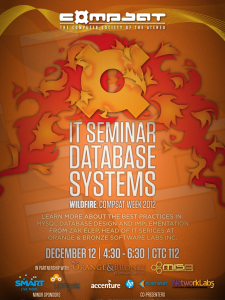
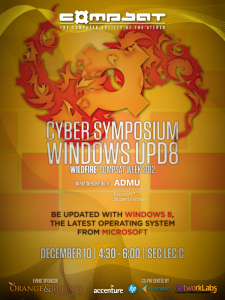
IT Seminar and Cyber Symposium refines man’s ability to self-produce lower level classes, an ability unique to geeks. It provides new and innovative ways in developing software and in being IT people in general.

Geek Shirt Sale is really more concerned with code organization than optimization. The Geek Shirt Sale helps instances of with the Man interface to arrange code, fix indentations and spacing, rename variables to follow conventions, and basically make your code more pleasant to look at. Make those lines pretty!
 ROFL gives a chance for geeks to expand the resources which they have access to by a dramatic amount. By allocating a minimum of 5 units of resources, geeks can get access to a 23” LCD TV, a Samsung phone, or a 1TB Hard Drive. Unlike the other parts of the project, participation in ROFL is not limited to one time. Instantiations of Geek can allocate as much resources as they deem optimal. More resources allocated means it’s easier for that particular instantiation to win the prizes.
ROFL gives a chance for geeks to expand the resources which they have access to by a dramatic amount. By allocating a minimum of 5 units of resources, geeks can get access to a 23” LCD TV, a Samsung phone, or a 1TB Hard Drive. Unlike the other parts of the project, participation in ROFL is not limited to one time. Instantiations of Geek can allocate as much resources as they deem optimal. More resources allocated means it’s easier for that particular instantiation to win the prizes.
Digital Design Competion improves upon the aesthetic aspect of a geek’s self-production ability. Geeks upload designs to a consensus where they are judged by earlier (read: older) instantiations. Uploads are separated into two categories: static art and moving art. Each of them has different themes to which uploads must conform to.
Omegathlon exercises the geeks’ cyber warfare suites. Each cyber warfare suite, usually integrated to instantiations of Geek, is unique to each geek. Some are built for FPS-type warfare. Some are better at RTS-type warfare while some are good at both. Those broad types (which aren’t the only ones) can still be narrowed into more specific modes of battle. The MMO-type warfare, for example, has RAN Online, Ragnarok, Guild Wars, and Perfect World among others. The RTS-type encompasses Warcraft, Dawn of War, Starcraft and many others. Omegathlon seeks to instill proficiency in at least one of these.
Besides providing these services, the project itself is also a consensus (read: community) which allows basic self-optimization naturally. C’mon and help yourself by optimizing your code at Wildfire! With all these tweaks, how can you say no?

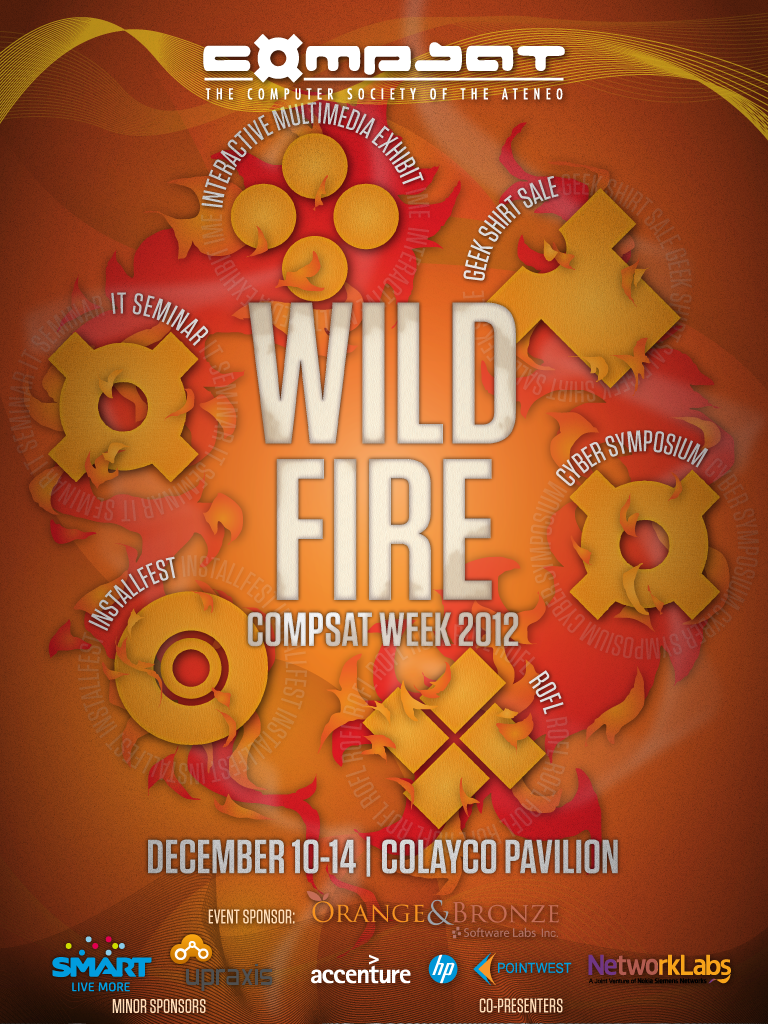
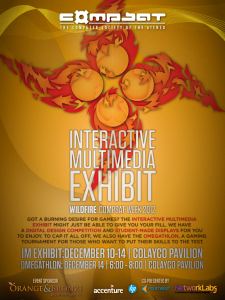
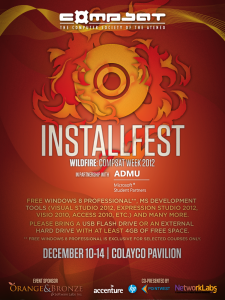
Comments